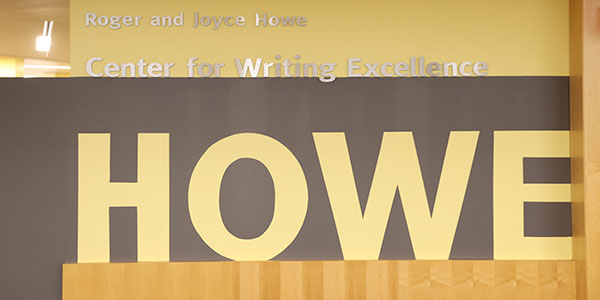Howe Center’s Sensemaking for Student Success program receives Lumina grant
Eight Ohio-based teams will benefit from innovative Fellows Program method

Howe Center’s Sensemaking for Student Success program receives Lumina grant
An expanded version of the Howe Center for Writing Excellence’s Faculty Writing Fellows Program will soon reach a wider audience.
The Howe Center, under the direction of director Elizabeth Wardle, recently earned a $300,000 grant from Lumina Foundation, an independent, private foundation based in Indianapolis that is committed to making opportunities for learning beyond high school available to all. The funds will be used for “Sensemaking for Student Success: A Cohort-Based Faculty Change Method,” an initiative that will expand the Howe Center’s pioneering Fellows Program to help faculty from higher education institutions across Ohio.
Wardle will again work with Alex Arreguin and Stacy Wilson, faculty members of the Maricopa County Community College District in Arizona, on the Sensemaking project. Arreguin and Wilson piloted a version of the center’s Fellows Program for their colleagues in summer 2022, with great success.
The Howe Center’s signature Fellows Program, guides teams of faculty over an extended period in their efforts to teach students how to write most effectively in their discipline.
When Arreguin and Wilson inquired about using the method – and when it was so successful – it became apparent to Wardle how useful the program was in leveraging faculty to make real and meaningful change, not only at Miami but also at a 2-year, open-access institution such as Maricopa’s Mesa Community College.
“The long-term goal of the project is to take our Fellows method for leveraging faculty expertise to a national audience,” Wardle said. “We are starting with Ohio for our first year of funding, inviting eight teams from higher education institutions around the state, and learning what problems they want to solve.”
Each Sensemaking team will feature three to six members from a shared discipline, field, or program who will participate in the program over 18 months. There will be an eight-day seminar at Miami July 21-28, followed by monthly coaching calls through June 2025, as well as an online showcase of the change projects.
The deadline to register is April 1.
“It’s exciting for faculty to recognize they can make a broader, systematic impact if they have this opportunity to work together,” Wardle said. “We have a model that could be useful nationally, and the need is pretty urgent. We’ve been able to innovate a method here that really leverages faculty expertise for the hard problems that higher education is facing, and this is really a pivotal moment in the history of higher education.”
More than 170 faculty members at Miami have completed the Fellows Program, with another 70 from Maricopa.
Wardle has been with the Howe Center since 2016 and has co-authored books promoting deep change around teaching and learning, including “Changing Conceptions, Changing Practices: Innovating Teaching Across the Disciplines” and “Writing Expertise: A Research-Based Approach to Writing and Learning Across Disciplines.”
Thanks to a generous endowment of $15 million from alumni Roger ’57 and Joyce Howe ’57 the center is able to generate pioneering methods like the Fellows Program.
“This wouldn’t be possible without the resources that the Howes have provided Miami,” Wardle said. “It really does demonstrate that Miami is a national leader in the teacher-scholar model and innovative learning.”